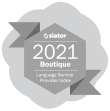Top 3 Localization Tips When Entering German-Speaking Markets
Author: Andreea Balaoiu
Top 3 Localization Tips When Entering German-Speaking Markets
As the global market continues to evolve and become interconnected, businesses are increasingly driven by the changing requirements and demands of international markets. This results in continuously rising demand for Translation and Localization Services in developed countries, particularly in the German landscape —the industrial and technological powerhouse of Europe.
According to a study on “The social-ecological market economy in Germany”, published by the Deutsche Gesellschaft für Internationale Zusammenarbeit (GIZ) GmbH (2018), the stability and integrity of the German market rest on 3 major pillars:
- Economic prosperity: At the core of the market economy is the individual. Individuals act self-responsibly and interact with other individuals within a framework of balanced rules, which aim at maximizing overall welfare. The German market economy operates within clear boundaries and institutions, fostering vibrant competition and innovation and a strong export orientation, creating material wealth and steady economic growth.
- Social cohesion: A highly developed social welfare system and a progressive tax system ensure a broad redistribution of welfare gains among different social groups and across regions. A comprehensive social safety net protects individuals and households and secures the desired level of social cohesion, which in turn contributes to economic prosperity.
- Ecological sustainability: Ecological policies in Germany rely on standards and regulation as well as specifically designed market mechanisms. The political and societal consensus in Germany to operate within the boundaries of the social-ecological market economy is widely shared.
Considering the above, here are the best content localization tips you should be mindful of before entering any of the German-speaking markets.
Tip #1: When localizing content for the German market, you must align with the German cultural framework
As defined by Cermak & Smutny in their paper on “A Framework for Cultural Localization of Websites and for Improving Their Commercial Utilization“ (2018), cultural Localization is the process of adjustment of culturally sensitive parts of a product, service, or business model in order to adhere to the particular requirements of a target market. In the field of websites, it refers mainly to the localization of content and web design (Graphical User Interface). Cultural localization is of paramount importance when companies seek to align their business models or content with the prerequisites of a foreign market, particularly one such as Germany or German-speaking locales.
Many international companies are often on the verge of a faux pas, not dedicating enough time to understanding the regional differences between the German-speaking markets and other international markets in terms of purchase behavior, marketing content strategy targeting, and consumer proclivities that will ultimately favorably influence their overall translation and localization endeavor for the German-speaking market.


Tip #2: Overcome the ‘Berlin Wall’ and pay extra attention to German market linguistic accuracy and relevance
When Localizing B2B lingo for German enterprises, extra attention should be paid to the relevant linguistic level of formality. Generally, customer relationships are bound to be successful if ‘high German’ or the standard, literary German language is accurately employed, as opposed to other dialects. It goes without saying that a pristine localization process for German markets must also always be competitive and ahead of the trends, particularly when tackling specific product lines or assortments, packaging and/or regulatory information, sales, and marketing strategy, etc.
The more relevant the linguistic use case for the German market and audience requirements, the better results it will yield for the businesses employing the Localization process to break onto the German scene with their business.
Additionally, it is very important to be mindful of the wordiness of the German language, with its plethora of compound words, consisting of two or more nouns written together to denominate an entire phrase. This might prove a real challenge for your business, particularly when tackling marketing and website localization, so the best practice would dictate always setting a higher target language volume allowance for the German localizations.
Tip #3: Get your facts straight and get acquainted with the German legal framework
When international businesses seek a foolproof localization of their business model or products for German-speaking markets, it goes without saying that having a flexible and highly adaptive approach must be top of mind.
Just as we have observed in our previous blog post on Localization tips when entering French-speaking Markets, German data privacy laws and regulations are highly stringent and do not condone recurring mistakes. The best approach when tackling the translation and localization of such exact texts for the German markets is to employ legal attorneys that can consult with the subject matter experts engaged in the localization process to fact check the material before release, and also be as factual and as direct as possible for the German audience, which prefers eloquent and brief discourse.

The Bottom Line
Throughout this article, we have seen what makes an effective Content Localization Strategy for entering German-speaking markets, with its multiple layers of content processing and adaptation to streamline the workflow and connect with a new audience, addressing specific features such as purchasing habits, customer behaviors, and cultural differences for the specifically targeted geographies.
At AD VERBUM, we take great pride in our extensive portfolio of professional Localization Services for a wide range of content types, from exact texts to creative writing. Our Professional Localization services are provided by multivalent content SMEs, native in the highest-ranking language combinations within the market, guiding you along every step of the intricate Localization processes and giving you a voice to speak globally through the right content, tailored to your needs.










